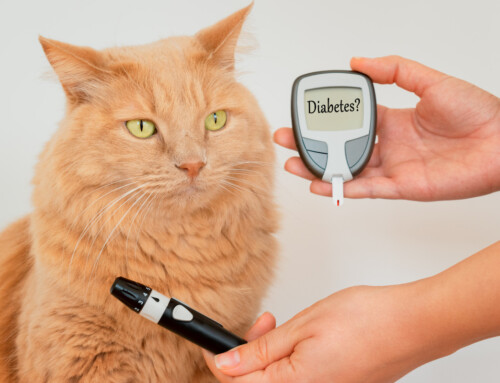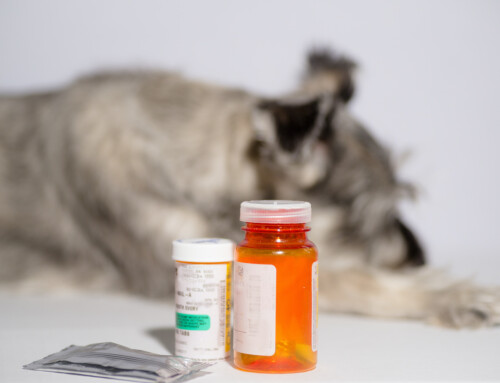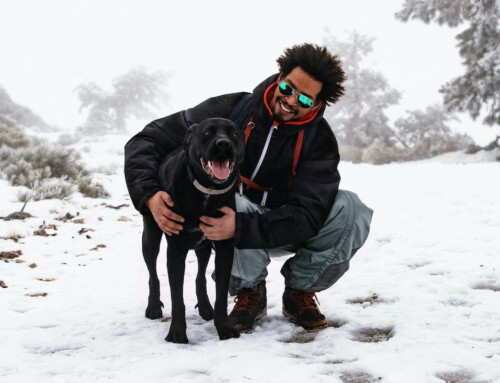Everyone knows at least one person in their life who has been affected by cancer. It can be detrimental to a family and a very delicate subject to address. No one wants to think of the possibility of it happening to them, let alone their pet. We often like to believe that what we see as a major health risk in our own lives, our beloved pets are untouchable by. May is Pet Cancer Awareness Month and it is in place to bring awareness to the leading disease-related cause of death for domestic cats and dogs in the U.S.
During Pet Cancer Awareness Month, there is an effort to educate pet owners on how to prevent, detect, and treat cancer in their pets. Over the years, the statistics of cancer in household pets has increased. The cause of cancer in pets is still largely unknown, however, household pets are just as likely to get cancer as humans. Just like humans, there are several different types of cancer that your cat or dog could be at risk for. They include lymphoma, splenic (spleen) cancer, bone or joint cancer, liver cancer, thoracic cancer, bladder cancer, oral cancer, brain cancer, spinal cord cancer, and anal sac cancer. Don’t worry -there is good news. There are advancements being made in detection and treatment for cancer in pets every day.
Know What To Look For
Early detection is one of the best defenses against any kind of cancer. Here are some things to keep an eye on concerning your pet’s health:
A Lump that has Grown or Changed
Any lump on a pet should be examined, especially if it is rapidly growing or changing in texture. Having a biopsy done on the lump can let you know whether you need to take action or if you can rest easy.
Swollen Lymph Nodes
Just like humans, pets have lymph nodes located throughout the body and they are most detectable behind their jaws and knees. When they are swollen, it might suggest a common type of cancer known as lymphoma.
Abdominal Distension
When your pet’s stomach area becomes rapidly enlarged, it may suggest a mass like a tumor is in the abdomen or that some internal bleeding has occurred in the area. Talk to your vet about getting an ultrasound or radiograph to diagnose the cause.
Significant and Chronic Weight Loss
If your pet begins losing weight and you haven’t changed anything about their diet or their day-to-day activities, it is time to get them checked out. This does not always mean cancer, but it usually indicates something is wrong. It is common for pets with cancer to experience weight loss.
Chronic Vomiting or Diarrhea
You should take your animal to the vet to get examined if this occurs because most often this is a sign that something is wrong. Tumors in the gastrointestinal tract can cause vomiting and diarrhea in pets.
Bleeding
If your pet is bleeding from the mouth, nose, penis, vagina, or gums, it should be examined immediately. Whether it is from trauma, injury, or it is unexplainable, bleeding should be thoroughly examined to ensure a pet’s safety and health. Bleeding can be caused by a number of things other than cancer.
Coughing
A dry, chronic cough in an older pet is a sign that it might need to have a radiograph taken and its chest examined. A dry cough is the most common sign of lung cancer. Coughing, like bleeding, can be caused by a number of things other than cancer in cats and dogs.
Lameness
In larger breeds of dogs, unexplained lameness is a common sign of bone cancer. Radiographs of the affected area can help determine what the cause is.
Trouble Using the Bathroom
Difficulty urinating or blood in the urine are often signs of urinary tract infection (UTI). If these symptoms do not clear up after antibiotics have been taken, it might be the sign of something bigger.
Bad Breath
While this might seem like the most common symptom, it takes a closer examination of your pet’s eating habits and any odors in their mouth. Oral tumors occur in pets and it can cause a pet to change what they eat and how they eat. A foul odor can be detected in pets with oral tumors and stomach tumors. Further examination is necessary to determine the cause of the problem.
If you feel your pet may be at risk or is exhibiting any of these symptoms, schedule an appointment with Main St. Vets. Early detection is the best defense against cancer in your loved ones!








